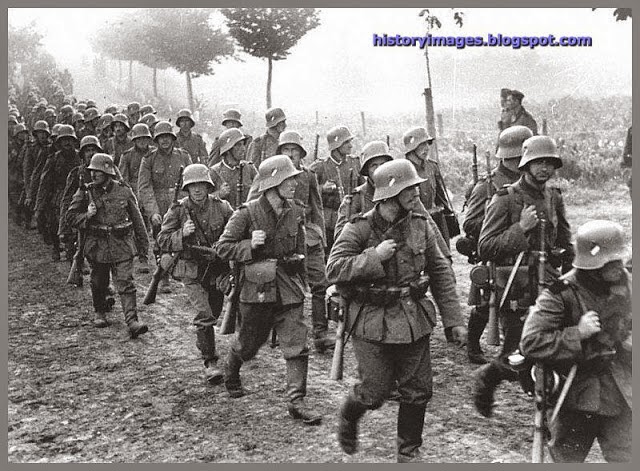On this date, September 1, 1939, Nazi Germany and Slovakia invade Poland, beginning the European phase of World War II. I will post information from Wikipedia about the battle.
 |
September 1, 1939. 6 am. German troops start moving into Poland |
| |||||||||
Belligerents | |||||||||
Germany Slovakia (see details) | Poland | ||||||||
Commanders and leaders | |||||||||
| Gerd von Rundstedt (Army Group South) Ferdinand Čatloš (Army Bernolák) (Belorussian Front) Semyon Timoshenko (Ukrainian Front) | |||||||||
Strength | |||||||||
Germany: Joined on 17 September:60 divisions, 6 brigades, 9,000 guns, 2,750 tanks, 2,315 aircraft Slovakia: 3 divisions Soviet Union: 33+ divisions, 11+ brigades, 4,959 guns, 4,736 tanks, 3,300 aircraft 1,500,000 Germans, 466,516 Soviets, 51,306 Slovaks Grand total: 2,000,000+ | Poland: 39 divisions (some of them were never fully mobilized and concentrated), 16 brigades, 4,300 guns, 880 tanks, 400 aircraft Total: 950,000[Note 1] | ||||||||
Casualties and losses | |||||||||
Germany:[Note 2] 16,343 killed, 3,500 missing, 30,300 wounded Slovakia: 37 killed, 11 missing, 114 wounded 1,475 killed or missing, 2,383 wounded or: 5,327 killed, missing and wounded | Poland:[Note 4] 66,000 dead, 133,700 wounded, 199,700 total casualties, 694,000 captured 904,000 total losses | ||||||||
The Invasion of Poland, also known as the September Campaign or 1939 Defensive War (Polish: Kampania wrześniowa or Wojna obronna 1939 roku) in Poland and the Poland Campaign (German: Polenfeldzug) or Fall Weiß (Case White) in Germany, was an invasion of Poland by Germany, the Soviet Union, and a small Slovak contingent that marked the beginning of World War II in Europe. The German invasion began on 1 September 1939, one week after the signing of the Molotov–Ribbentrop Pact, while the Soviet invasioncommenced on 17 September following the Molotov-Tōgō agreement which terminated the Russian and Japanese hostilities (Nomonhan incident) in the east on 16 September. The campaign ended on 6 October with Germany and the Soviet Union dividing and annexing the whole of Poland.
The morning after the Gleiwitz incident, German forces invaded Poland from the north, south, and west. As the Germans advanced, Polish forces withdrew from their forward bases of operation close to the Polish–German border to more established lines of defence to the east. After the mid-September Polish defeat in the Battle of the Bzura, the Germans gained an undisputed advantage. Polish forces then withdrew to the southeast where they prepared for a long defence of the Romanian Bridgeheadand awaited expected support and relief from France and the United Kingdom. Those two countries had pacts with Poland and had declared war on Germany on 3 September, though in the end their aid to Poland in the September campaign was very limited.
The Soviet Red Army's invasion of Eastern Poland on 17 September, in accordance with a secret protocol of the Molotov–Ribbentrop Pact, rendered the Polish plan of defence obsolete. Facing a second front, the Polish government concluded the defence of the Romanian Bridgehead was no longer feasible and ordered an emergency evacuation of all troops to neutral Romania. On 6 October, following the Polish defeat at the Battle of Kock, German and Soviet forces gained full control over Poland. The success of the invasion marked the end of the Second Polish Republic, though Poland never formally surrendered.
On 8 October, after an initial period of military administration, Germany directly annexed western Poland and the former Free City of Danzig and placed the remaining block of territory under the administration of the newly established General Government. The Soviet Union incorporated its newly acquired areas into its constituent Belarusian and Ukrainian republics, and immediately started a campaign of sovietization. In the aftermath of the invasion, a collective of underground resistance organizations formed the Polish Underground State within the territory of the former Polish state. Many of the military exiles that managed to escape Poland subsequently joined the Polish Armed Forces in the West, an armed force loyal to the Polish government in exile.